英语连读规则大全
英语连读规则大全
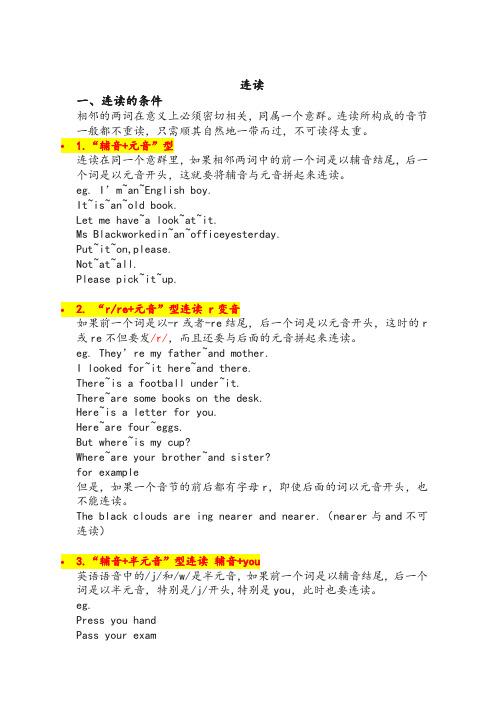
连读一、连读的条件相邻的两词在意义上必须密切相关,同属一个意群。
连读所构成的音节一般都不重读,只需顺其自然地一带而过,不可读得太重。
∙ 1.“辅音+元音”型连读在同一个意群里,如果相邻两词中的前一个词是以辅音结尾,后一个词是以元音开头,这就要将辅音与元音拼起来连读。
eg. I’m~an~English boy.It~is~an~old book.Let me have~a look~at~it.Ms Blackworkedin~an~officeyesterday.Put~it~on,please.Not~at~all.Please pick~it~up.∙ 2. “r/re+元音”型连读 r变音如果前一个词是以-r或者-re结尾,后一个词是以元音开头,这时的r 或re不但要发/r/,而且还要与后面的元音拼起来连读。
eg. They’re my father~and mother.I looked for~it here~and there.There~is a football under~it.There~are some books on the desk.Here~is a letter for you.Here~are four~eggs.But where~is my cup?Where~are your brother~and sister?for example但是,如果一个音节的前后都有字母r,即使后面的词以元音开头,也不能连读。
The black clouds are ing nearer and nearer.(nearer与and不可连读)∙ 3.“辅音+半元音”型连读辅音+you英语语音中的/j/和/w/是半元音,如果前一个词是以辅音结尾,后一个词是以半元音,特别是/j/开头,特别是you,此时也要连读。
eg.Press you handPass your examguess your ageDid you see itdid you like itThank~you.Nice to meet~you.Did~you get there late~again?Would~you like~a cup~of tea?Could~you help me, please?“音的同化”—常把/d/+/j/读成/dV/,did you听上成了/dIdVu/,would you成了 /wudVu/,could you成了 /kudVu/。
英语连读规则大全
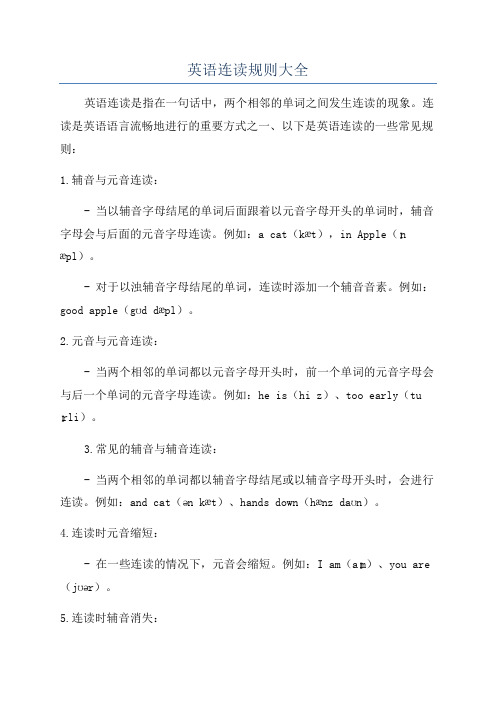
英语连读规则大全英语连读是指在一句话中,两个相邻的单词之间发生连读的现象。
连读是英语语言流畅地进行的重要方式之一、以下是英语连读的一些常见规则:1.辅音与元音连读:- 当以辅音字母结尾的单词后面跟着以元音字母开头的单词时,辅音字母会与后面的元音字母连读。
例如:a cat(kæt),in Apple(ɪnæpl)。
- 对于以浊辅音字母结尾的单词,连读时添加一个辅音音素。
例如:good apple(gʊd dæpl)。
2.元音与元音连读:- 当两个相邻的单词都以元音字母开头时,前一个单词的元音字母会与后一个单词的元音字母连读。
例如:he is(hi z)、too early(tu ɪrli)。
3.常见的辅音与辅音连读:- 当两个相邻的单词都以辅音字母结尾或以辅音字母开头时,会进行连读。
例如:and cat(ən kæt)、hands down(hænz daʊn)。
4.连读时元音缩短:- 在一些连读的情况下,元音会缩短。
例如:I am(aɪm)、you are (jʊər)。
5.连读时辅音消失:- 在一些连读的情况下,辅音会消失或减轻发音。
例如:this is(ðɪz)、have to(hæftʊ)。
6.连读时辅音变化:- 在一些连读的情况下,辅音会发生变化。
例如:at the(ædə)、had to(hædə)。
7.连读时舌尖音符号变化:- 当相邻的词以舌尖音符号结尾时,会变成舌根音符号。
例如:thick hair(θɪɡ keər)。
8.冠词与名词的连读:- 当冠词"the"与以元音字母开头的名词相连时,发生连读。
例如:the apple(ði æpl)。
9.数词与名词的连读:- 在一些情况下,当以单数的数词开头的名词连读时,数词的发音会变得更轻,名词的发音会变得更强。
(完整版)英语连读发音规则_汇总

英语连读发音的一般规则一、连读的条件:相邻的两词在意义上必须密切相关,同属一个意群。
连读所构成的音节一般都不重读,只需顺其自然地一带而过,不可读得太重,也不可音。
(连读符号:~)二、连读规则1.“辅音+元音”型连读在同一个意群里,如果相邻两词中的前一个词是以辅音结尾,后一个词是以元音开头,这就要将辅音与元音拼起来连读。
I’m~an~English boy.It~is~an~old book.Let me have~a look~at~it.Ms Black worked in~an~office last~yesterday.I called~you half~an~hour~ago.Put~it~on, please.Not~at~all.Please pick~it~up.2.“r/re+元音”型连读如果前一个词是以-r或者-re结尾,后一个词是以元音开头,这时的r 或re不但要发/r/,而且还要与后面的元音拼起来连读。
They’re my father~and mother.I looked for~it here~and there.There~is a football under~it.There~are some books on the desk.Here~is a letter for you.Here~are four~eggs.But where~is my cup?Where~are your brother~and sister?但是,如果一个音节的前后都有字母r,即使后面的词以元音开头,也不能连读。
The black clouds are coming nearer and nearer.(nearer与and 不可连读)there 与is 连读为theris [ðєә ris] there与are 连读为therare[ðєә ra]3.“辅音+半元音”型连读英语语音中的/j/和/w/是半元音,如果前一个词是以辅音结尾,后一个词是以半元音,特别是/j/开头,此时也要连读。
英语连读规则大全

连读一、连读的条件相邻的两词在意义上必须密切相关,同属一个意群。
连读所构成的音节一般都不重读,只需顺其自然地一带而过,不可读得太重。
∙ 1.“辅音+元音”型连读在同一个意群里,如果相邻两词中的前一个词是以辅音结尾,后一个词是以元音开头,这就要将辅音与元音拼起来连读。
eg. I’m~an~English boy.It~is~an~old book.Let me have~a look~at~it.Ms Blackworkedin~an~officeyesterday.Put~it~on,please.Not~at~all.Please pick~it~up.∙ 2. “r/re+元音”型连读 r变音如果前一个词是以-r或者-re结尾,后一个词是以元音开头,这时的r 或re不但要发/r/,而且还要与后面的元音拼起来连读。
eg. They’re my father~and mother.I looked for~it here~and there.There~is a football under~it.There~are some books on the desk.Here~is a letter for you.Here~are four~eggs.But where~is my cup?Where~are your brother~and sister?for example但是,如果一个音节的前后都有字母r,即使后面的词以元音开头,也不能连读。
The black clouds are coming nearer and nearer.(nearer与and 不可连读)∙ 3.“辅音+半元音”型连读辅音+you英语语音中的/j/和/w/是半元音,如果前一个词是以辅音结尾,后一个词是以半元音,特别是/j/开头,特别是you,此时也要连读。
eg.Press you handPass your examguess your ageDid you see itdid you like itThank~you.Nice to meet~you.Did~you get there late~again?Would~you like~a cup~of tea?Could~you help me, please?“音的同化”—常把/d/+/j/读成/dV/,did you听上成了/dIdVu/,would you成了 /wudVu/,could you成了 /kudVu/。
史上最全最全的英语连读规则
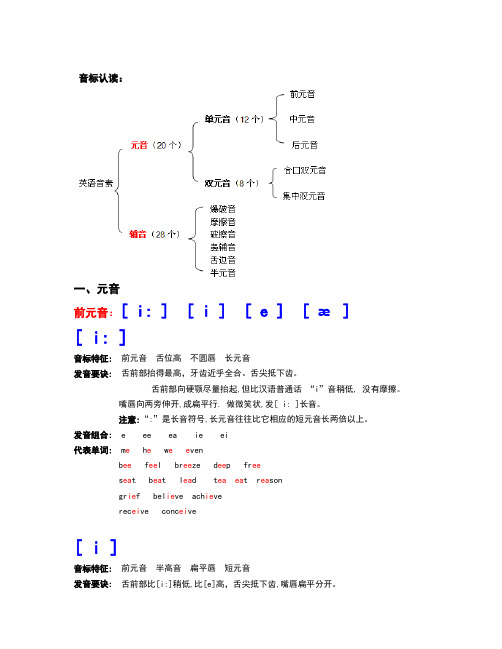
音标认读:一、元音前元音:[ i: ] [ i ] [ e ] [ æ ][ i: ]音标特征:前元音舌位高不圆唇长元音发音要诀:舌前部抬得最高,牙齿近乎全合。
舌尖抵下齿。
舌前部向硬颚尽量抬起,但比汉语普通话“i”音稍低, 没有摩擦。
嘴唇向两旁伸开,成扁平行. 做微笑状,发[ i: ]长音。
注意:“:”是长音符号,长元音往往比它相应的短元音长两倍以上。
发音组合: e ee ea ie ei代表单词: m e h e w e e venb ee f ee l br ee ze d ee p fr ees ea t b ea t l ea d t ea ea t r ea songr ie f bel ie ve ach ie verec ei ve conc ei ve[ i ]音标特征: 前元音半高音扁平唇短元音发音要诀: 舌前部比[i:]稍低,比[e]高,舌尖抵下齿,嘴唇扁平分开。
牙床也开得稍大一些比[ i:]稍宽,比[ e ]窄。
上下齿之间的距离大约可以容纳一个小指尖。
使下颚稍稍下垂,舌前部也随之稍稍下降,即可发出短促[ i ]音。
发音组合: i代表单词: s i t b i t k i ck p i ck w i sh音标对比: [ i: ] [ i ]s ea t s i tb ea t b i tsh ee p sh i p[ e ]音标特征:前元音半高音不圆唇短元音发音要诀:舌尖抵下齿, 舌前部稍抬起, 舌后接近硬颚, 比[ i:] 低。
牙床也开得半开半合,比[ i:] 宽,整体做微笑状。
上下齿之间的距离大约相当于一个食指尖。
发音组合: e ea a代表单词:p e n t e n b e st b e g e gg n e tbr ea d h ea venm a rry a ny m a ny音标对比:[ i ] [ e ]s i t s e tl i ft l e ftd i d d ea d[æ]音标特征: 前元音低舌音不圆唇短元音发音要诀: 舌前部最低,双唇向两旁平伸,成扁平行牙床开的最大。
史上最全的英语连读规则一网打尽
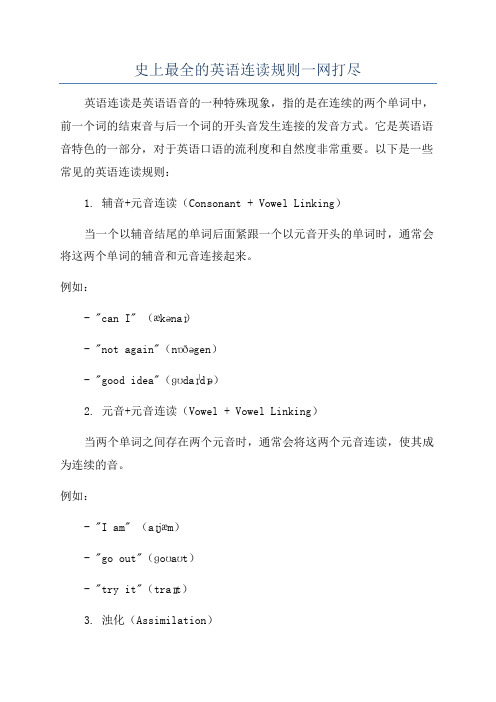
史上最全的英语连读规则一网打尽英语连读是英语语音的一种特殊现象,指的是在连续的两个单词中,前一个词的结束音与后一个词的开头音发生连接的发音方式。
它是英语语音特色的一部分,对于英语口语的流利度和自然度非常重要。
以下是一些常见的英语连读规则:1. 辅音+元音连读(Consonant + Vowel Linking)当一个以辅音结尾的单词后面紧跟一个以元音开头的单词时,通常会将这两个单词的辅音和元音连接起来。
例如:- "can I" (ækənaɪ)- "not again"(nɒðəgen)- "good idea"(ɡʊdaɪˈdɪə)2. 元音+元音连读(Vowel + Vowel Linking)当两个单词之间存在两个元音时,通常会将这两个元音连读,使其成为连续的音。
例如:- "I am" (aɪjæm)- "go out"(ɡoʊaʊt)- "try it"(traɪɪt)3. 浊化(Assimilation)当一个以清辅音结尾的单词后面紧跟一个以辅音开头的单词时,清辅音(如/p/,/t/,/k/等)通常会变成其相应的浊辅音(如/b/,/d/,/ɡ/等)。
例如:- "cup of tea"(kʌbəvˈtiː)- "that guy"(ðæɡaɪ)- "big dog"(bɪdoɡ)4. 借音(Epenthesis)当一个以元音结尾的单词后面紧跟一个以辅音开头的单词时,在这两个单词之间通常会插入一个短促的/i/音(schwa)。
例如:- "crazy idea"(kreɪziˈaɪdiə)- "my old"(maɪoʊld)5. 弱元音免略(Weak Vowel Deletion)在一些情况下,一个单词中的弱元音(如/i/,/ə/)可能会被省略掉,使得两个单词的发音更加流畅。
英语连读规则大全实用
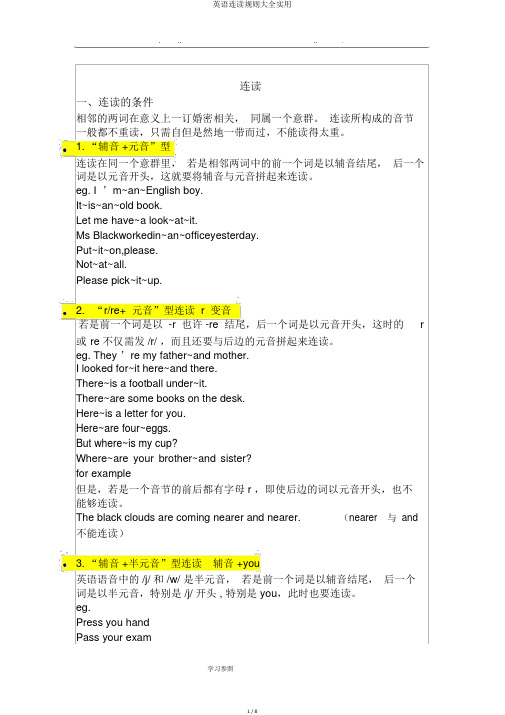
......连读一、连读的条件相邻的两词在意义上一订婚密相关,同属一个意群。
连读所构成的音节一般都不重读,只需自但是然地一带而过,不能读得太重。
1.“辅音 +元音”型连读在同一个意群里,若是相邻两词中的前一个词是以辅音结尾,后一个词是以元音开头,这就要将辅音与元音拼起来连读。
eg. I ’m~an~English boy.It~is~an~old book.Let me have~a look~at~it.Ms Blackworkedin~an~officeyesterday.Put~it~on,please.Not~at~all.Please pick~it~up.2.“r/re+ 元音”型连读 r 变音若是前一个词是以 -r 也许 -re 结尾,后一个词是以元音开头,这时的r 或re 不仅需发 /r/ ,而且还要与后边的元音拼起来连读。
eg. They ’re my father~and mother.I looked for~it here~and there.There~is a football under~it.There~are some books on the desk.Here~is a letter for you.Here~are four~eggs.But where~is my cup?Where~are your brother~and sister?for example但是,若是一个音节的前后都有字母 r ,即使后边的词以元音开头,也不能够连读。
The black clouds are coming nearer and nearer.(nearer与and 不能连读)3.“辅音 +半元音”型连读辅音 +you英语语音中的 /j/ 和 /w/ 是半元音,若是前一个词是以辅音结尾,后一个词是以半元音,特别是 /j/ 开头 , 特别是 you,此时也要连读。
eg.Press you handPass your examguess your ageDid you see itdid you like itThank~you.Nice to meet~you.Did~you get there late~again?Would~you like~a cup~of tea?Could~you help me, please?“音的同化”—常把 /d/+/j/ 读成 /dV/ ,did you 听上成了 /dIdVu/ ,would you 成了 /wudVu/ , could you 成了 /kudVu/ 。
英语连读的规则

英语连读的规则
英语连读是一种快速、自然的语音表达方式,在英语口语中广泛使用。
其规则如下:
1. 声母连读:单词的结尾是辅音,下一个单词的开头也是辅音时,两个辅音顺序相连形成一个新的辅音。
比如:“cupboard is”连读为[kʌpbɔrdɪz]。
2. 元音连读:相邻的两个单词都以元音结尾或开头时,连读成一个长元音或双元音。
比如:“she is”连读为[ʃi:z]。
3. 省略连接词的连读:在口语中,常省略连接词进行连读。
比如:“I'm gonna”连读为[aɪm'gʌnə]。
4. 连读的速度和语调:口语中连读的速度要比书面语要快,需要注意语调的变化,重读和弱读的变化,这样才能让连读表达更加自然。
总之,英语连读是英语口语中不可或缺的一部分,需要注意练习和灵活使用。
- 1、下载文档前请自行甄别文档内容的完整性,平台不提供额外的编辑、内容补充、找答案等附加服务。
- 2、"仅部分预览"的文档,不可在线预览部分如存在完整性等问题,可反馈申请退款(可完整预览的文档不适用该条件!)。
- 3、如文档侵犯您的权益,请联系客服反馈,我们会尽快为您处理(人工客服工作时间:9:00-18:30)。
连读一、连读的条件相邻的两词在意义上必须密切相关,同属一个意群。
连读所构成的音节一般都不重读,只需顺其自然地一带而过,不可读得太重。
∙ 1.“辅音+元音”型连读在同一个意群里,如果相邻两词中的前一个词是以辅音结尾,后一个词是以元音开头,这就要将辅音与元音拼起来连读。
eg. I’m~an~English boy.It~is~an~old book.Let me have~a look~at~it.Ms Blackworkedin~an~officeyesterday.Put~it~on,please.Not~at~all.Please pick~it~up.∙ 2. “r/re+元音”型连读r变音如果前一个词是以-r或者-re结尾,后一个词是以元音开头,这时的r或re不但要发/r/,而且还要与后面的元音拼起来连读。
eg. They’re my father~and mother.I looked for~it here~and there.There~is a football under~it.There~are some books on the desk.Here~is a letter for you.Here~are four~eggs.But where~is my cup?Where~are your brother~and sister?for example但是,如果一个音节的前后都有字母r,即使后面的词以元音开头,也不能连读。
The black clouds are coming nearer and nearer.(nearer与and不可连读)∙ 3.“辅音+半元音”型连读辅音+you英语语音中的/j/和/w/是半元音,如果前一个词是以辅音结尾,后一个词是以半元音,特别是/j/开头,特别是you,此时也要连读。
eg.Press you handPass your examguess your ageDid you see itdid you like itThank~you.Nice to meet~you.Did~you get there late~again?Would~you like~a cup~of tea?Could~you help me, please?“音的同化”—常把/d/+/j/读成/dV/,did you听上成了/dIdVu/,would you 成了/wudVu/,could you成了/kudVu/。
∙加j: 前一个词是以/ei/ /ai/ /ɔ:/ /i:/ /i/ /e/ 这几个元音结尾的情况时需在后面加上/j/∙Hurry up∙加 w: 遇到前一个词是以/au/ //ɚu//u:/ /u/结尾的情况时需在后面加上/w/∙How often do you swim?∙ 4.“元音+元音”元音音素型连读如果前一个词以元音结尾,后一个词以元音开头,这两个音往往也要自然而不间断地连读到一起。
eg. I~am Chinese.He~is very friendly to me.She wants to study~English.How~and why did you come here?She can’t carry~it.It’ll take you three~hours to walk there.The question is too~easy for him to answer.∙ 5.当短语或从句之间按意群进行停顿时,意群与意群之间即使有两个相邻的辅音与元音出现,也不可连读。
Is~it a~hat or a cat?(hat与or之间不可以连读)There~is~a good book in my desk. (book与in之间不可以连读)Can you speak~English or French? (English与or之间不可以连读)Shall we meet at~eight or ten tomorrow morning? (meet与at,eight与or 之间不可以连读)She opened the door and walked~in. (door与and之间不可以连读)二、失去爆破6个爆破音有3对/p/,/b/; /t/,/d/; /k/,/g/失去爆破,又叫不完全爆破,就是在某些情况下,只须做出发音的准备,但并不发音,稍稍停顿后就发后面的音。
∙ 1.“爆破音+爆破音”型6个爆破音中的任意2个相临时,前一个爆破音会失去爆破,即由相关的发音器官做好这个发音的姿势,稍做停顿后即发后面的爆破eg. The girl in the re(d) coat was on a bla(ck) bike jus(t) now.The bi(g) bus from the fa(c) tory is full of people.Wha(t) time does he get up every morning?This is an ol(d) pi(c)ture of a bi(g) car.The ol(d) do(c)tor has a ca(t), too.We’re going to wor k on a farm nex(t) Tuesday.What would you like, ho(t) tea or bla(ck) coffee?It’s a very col(d) day, but it’s a goo(d) day.You can put i(t) down in the bi(g) garden.I bought a chea(p) book, but it’s a goo(d) book.∙ 2.“爆破音+摩擦音”型如果前面是爆破音,其后紧跟着某些摩擦音(如/f/,/s/,/W/,/T/等),那么前面那个爆破音仅有十分轻微的爆破,而后面那个摩擦音则要完全爆破。
eg. Goo(d) morning, Mr. Bell.Uncle Li’s fa(c)tory is qui(te) near to the cinema.I wen(t) there alone a(t) nine las(t) night.-Do you know his bi(ke) number? -Sorry, I don’(t) know.The forty-firs(t) lesson is qui(te) difficult.Goo(d) luck, Lin Tao.三、浊化∙1、[S] 后面的清辅音要浊化eg. discussion:[c] 浊化成[g]stand:[t] 浊化成[d]expression:[p]浊化成[b]∙2、美音中:[t] 在单词的中间被浊化成[d]如:writer,听起来和rider 的发音几乎没有区别letter—ladder美国人和加拿大人发音为了省事,习惯清音浊化,尤其是[t]在单词的中间一定会浊化成[d],但英国人发音不会这样,这也是英音和美音的一大区别。
了解这一浊化原则,会给听力带来一些帮助。
四、弱读一般来说:实词重读,如动词、名词、副词等;虚词弱读,如介词、代词等。
弱读的规则一般是:元音音节弱化成[E],如单词for, from, to, some, am, do, have, does强式[fC:] [frC:m] [tU:] [sQm] [Am] [dU:] [hAv] [dQz]弱式[f[] [fr[m] [t[] [s[m] [[m] [d[] [h[v] [d[z]五、英音和美音的差异由于美音的流行,四级考试听力也以美音为主,但是,由于历史的原因,我国大多数英语教师的发音,仍然以英音为主,所以,我们脑海中根深蒂固的英式发音,可能和磁带中的发音不一致,进而造成四级听力中的障碍。
英语和美语在读音上的差异主要反映在元音字母a, o 和辅音字母r 的不同读音上。
在ask, can't, dance, fast, path 这一类的单词中,英国人将字母a 读作[a:],而美国人则读作[æ],所以这些词在美国人口中就成了[Ask][kAnt][dAns][fAst]和[pB:W]。
常见的连读短语及句子1. Sit on the chair2. Without any difficulty3. in a minute4. a woman of forty5. best of all6. arrive in the city7. at eight o’clock8. an old man and a girl9. ask any person10. walk across the street11. on a foggy day12. a student in the English Department13. in our classroom14. talk with a friend of mine15. fall in the river16. tell us a story17. find it in my desk18. waited and waited19. run after it20. at the end of the street21. here and there22. sit at the other end of the room23. after a while24. take for example25. for an hour26. a pair of trousers27. wait for a student28. find the answer after all29. put more on her plate30. take care of it31. can’t hear it32. no air and water33. the other answer34. 150 kilometers per hour35. a fire in a forest36. discover a new star37. doctor and nurse38. far easier than that39. the owner of the house40. the paper in the desk1. I don’t understand the theory at all.2. Jane has saved a lot of money.3. It isn’t ou r mistake.4. My mother came and opened the door.5. Instead of a shirt, Tom bought a jacket.6. There was a man and a woman sitting behind me.7. I shall graduate from middle school in one and a half years.8. Don’t let him in while I’m reading.9. He is a tall and handsome young man.10. When I went into my office, he was talking with a friend of his.11. While I was waiting for our bus, the rain stopped.12. There is only one hospital in the town.13. Perhaps that pair of shoes will fit me.14. He came in and asked for a cup of coffee.15. Here is your bag.16. He is standing at the other end of the bridge.17. There are no clean glasses in the kitchen, we have used them all.18. Could you open the door for us?19. He didn’t finish his work until after eight yesterday evening.20. Don’t worry, we’ll find the answer after all.1. This is the lost and found office.2. My telephone number is 555-9470.3. I couldn’t help overhearing what you said about an orchestra.4. I’m in perfect health.5. I’ve a perfect heart.6. You win and I cook dinner for the entire family.7. She was impressed by the relaxed and informal atmosphere.8. I’m just here to do some research.9. Do you ever smoke at meal times?10. Some patients seemed almost normal.11. But wouldn’t you like to go into the village sometimes to buy your own tobacco?12. He was a gentle and mild-mannered old fellow.13. Dr. Carmichael was easily persuaded to let her talk to Maurice.14. Gillian felt slightly uneasy as the porter unlocked the gate and waved her through.15. Oh, thank you very much,Ok.16. I’ve never been out that way before at all to Australia or the Far East.17. The food was strictly fish and chips.18. In addition to this, we were most unhappy with the arrangements for our journey home.19. Have you ever been to an exhibition?20. The Indians are bad and the white man is good and brave.21. Columbus thought he had arrived in India.22. I remember going into the camp and getting a hot meal and clean clothes.23. You need to work at it.24. I made enough for an army.25. I’ll make you two fried egg.26. The same shift on Tuesday.27. Her last question is about her other interest.28. I hope your friend sends in an application.29. They have their own special characteristics.30. The o ther waiter hid the bottle I’d opened wrongly.31. This gas will put anyone to sleep for exactly three minutes.32. You’re going to go round to the manager’s desk and steal all the money.33. I think it’s risky.34. If you walk out with 50,000 pounds under your arm, somebody will surely notice you.35. You go into the bank with a motor-cycle helmet on, and a black rubbish bag in your pocket.36. When you get there, radio Ginger and tell him to come.37. Sport balloon flights are best early in the morning or late in the afternoon when the wind is light.38. The flight recorder of the DC10 airliner which crashed in the Antartic a fortnight ago.39. Fifteen people are to appear in court in Manchester.40. The trouble began when groups of rival supporters whose teams had both been playing London clubs began to insult each other.41. Would you like a weekend in Las Vagas?42. Mary stopped outside a shoe shop and looked in the window.43. When an atom is divided, heat appears.44. Talk of a quick election was pure speculation.45. He hoped it would lead to a basis for negotiation.46. How did you find it at first being stared at all day?47. People weren’t aware in a scientific way of the role of differentmicro-organisms and enzymes in producing different types of cheese.48. Cheese started being made on a large scale in factories.49. They might not become great artist or composers.50. It suddenly struck us that somebody must have taken this money.51. The point is that his university life might not have been so difficult if his ability has been recognized sooner.52. I knew it’s sudden, but this is an important opportunity.53. Well,I wasn’t clear about my future.54. It’s rather cold out here on the deck.55. Mike and I had a hamburger this afternoon and we talk.56. You couldn’t pick a finer medical school than Michigan.57.The small producer working from his farm dairy continued to exist and still exist today.。
